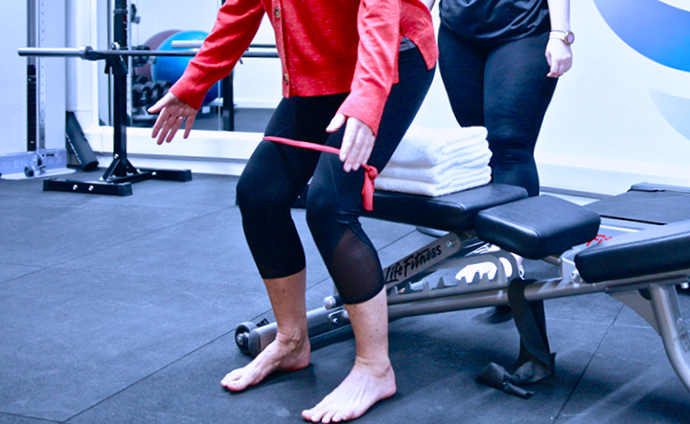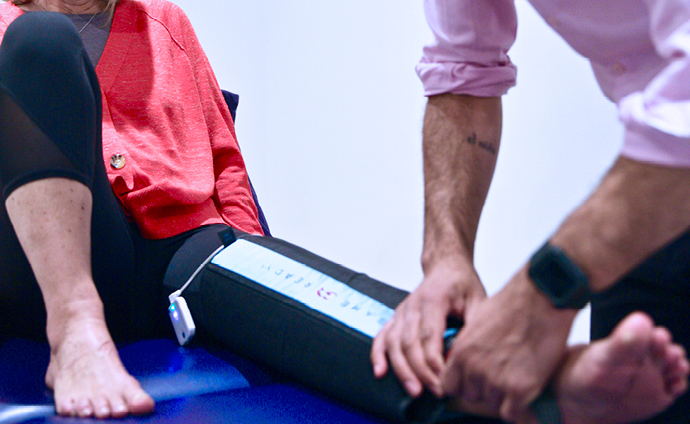Plantar fasciitis is one of those common conditions that can present in a variety of different patients. Whether it’s caused by a sports injury, genetics or lifestyle choices, plantar fasciitis causes pain and discomfort, which can then have a negative impact on all aspects of your life.
But what exactly is plantar fasciitis and, most importantly, how can physiotherapy help rid you of your foot pain?
What causes plantar fasciitis?
Essentially plantar fasciitis occurs when there is stress or inflammation on the fascia, which is a band of tissue that connects the bone of your heel to the front of your foot and toes. The role of this band is to act as a shock absorber when you do any sort of weight bearing exercise or movement. So, the more shock the fascia has to absorb, the more likely there is to be stress to the area.
Shock to the fascia can take many forms. For example, it’s not uncommon for avid runners to experience plantar fasciitis, as the high impact associated with running can cause small tears or irritation. But similarly, someone who is extremely overweight and simply doing incidental standing or walking could experience symptoms of plantar fasciitis too. Your general makeup and foot mechanics can also play a part — people with flat feet are commonly known to suffer from plantar fasciitis. Poor footwear, old age, spending a lot of time exercising on hard surfaces and general wear and tear are other possible causes, so as you can see, the root of the problem can be quite varied!

What are the symptoms of plantar fasciitis?
If you are suffering from plantar fasciitis you will most likely feel a stabbing pain in your heel or the arch of your foot. It may feel worse first thing in the morning, or when you get up and first move after sitting down for an extended period of time.
If exercise seems to be the cause for you, you may find the longer you undertake a specific activity, like running, the sharper the pain becomes.
How can you treat plantar fasciitis and cure my foot pain?
All Spectrum’s patients undergo a full assessment before we’ll diagnose you and formulate a personalised treatment plan that is tailored to your body, injury and goals. When it comes to foot pain, we will also normally start by doing gait analysis.
Gait analysis helps us to spot abnormal movement patterns in your walking or running style, which can then give us clues about what might be mechanically going wrong. Using the latest technology, we can identify not just how your foot strikes the ground, but also how your whole body moves. This allows us to draw conclusions about the impact on the surrounding joints and areas of the foot.
From here, we can make recommendations about things such as footwear that will provide you with better stability and support, through to guided exercise programmes to strengthen and release your fascia. A guided exercise program can be conducted in our London Clinic, which includes a specialised gym. The different exercises will be completely tailored to suit you off the back of the assessments and analysis previously mentioned, and will normally be performed consistently over a period of time until you make a full recovery.
Shockwave Therapy is one of the most impactful treatments for plantar fasciitis, stimulating blood vessels in the damaged tissue to help speed up your recovery. It will often be used in conjunction with a guided exercise programme, as a common treatment combo.
Dry Needling has also been proven to be a really effective treatment option for plantar fasciitis. The tiny acupuncture needles will shock the soft tissue of the fascia into releasing, providing pain relief. One of Spectrum’s lead physios, Rob Foyster, undertook an extra Certificate in Dry Needling on top of his physiotherapy qualification, so you know you’ll be in safe hands!
If you are suffering from acute plantar fasciitis, another unique treatment option we have on hand in our London clinic is our Game Ready Ice/Compression unit. Game Ready is one of the fastest ways to reduce acute inflammation, providing a quicker recovery and pain reduction by reaching deeper tissue than normal ice packs or compression.

So, what can happen if I don’t get treated?
If you push through the pain and don’t get treatment for plantar fasciitis, you may find yourself in chronic pain that is really difficult to shake — not just first thing in the morning or when you’re exercising, but at all times. When this happens, it’s common for people to overcorrect or change their gait to try, either consciously or subconsciously, to take the pressure off their foot, which can lead to a poor gait in other ways and cause referred issues such as knee, hip or back problems.
If you’re suffering from foot pain that could be plantar fasciitis, you should consult a physio for a personalised treatment plan. At Spectrum, we guarantee appointments within 24 hours, so book a time that suits you via our website.



